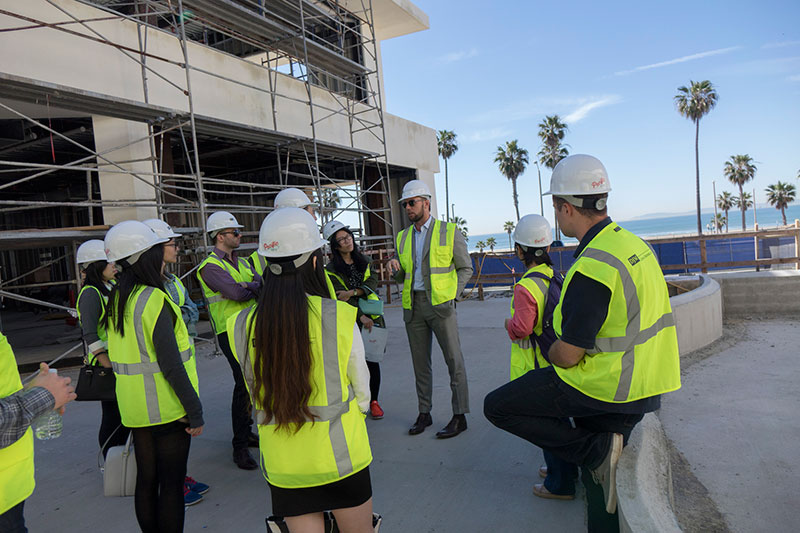BRED Curriculum

The curriculum for the Bachelor of Science in Real Estate Development spans the broader context of real estate allowing students to explore the full structure of real estate and its role in creating our cities and communities. Prerequisite courses integrate the many disciplines that are the foundation for real estate education, including accounting, economics, business finance, and the urban context. Real estate core classes taken through the Price School focus on real estate principals, financial analysis, market analysis, urban design, and the history of cities. Students select electives to complement their interests from either the Price School or related disciplines. Throughout the undergraduate program, classroom instruction is supplemented by professional practice as exemplified by the mandatory internship and capstone laboratory. Finally, the major is structured to provide students with sufficient elective credits to explore minor or other programs at USC.
Pre-Major Requirements (8 units)
- ECON 203g Principles of Microeconomics Units (4 units)
- MATH 117g Introduction to Mathematics for Business and Economics Units (4 units)
Foundational Core (20 units)
- RED 200 Introduction to Real Estate (4 units)
- PPD 245g The Urban Context for Policy and Planning Units (4 units)
- ACCT 410x Foundations of Accounting Units (4 units)
- RED 325 Introduction to Finance in Cities (4 units)
- PPD 303 Statistics for Policy, Planning, and Development Units (4 units)
Real Estate Core (24 units)
- RED 362 Real Estate Development Fundamentals Units (4 units)
- RED 375 Real Estate Development Analysis Units (4 units)
- RED 417 History of Planning and Development Units (4 units)
- RED 425 Designing Livable Communities Units (4 units)
- RED 435 Analyzing Real Estate Markets Units (4 units)
- RED 437 Advanced Finance and Investment for Real Estate Development Units (4 units)
Career Preparation & Internship (3 units)
- RED 201 Real Estate Career Seminar (2 units)
- RED 301 Real Estate Internship Seminar (1 unit)
Capstone (4 units, select one)
- PPD 431 Capstone: PPD Studies (4 units)
- PPD 497ab Senior Thesis (2 fall units & 2 spring units – Available only to seniors with 3.7 GPA in Price School courses and an overall 3.5 GPA).
Real Estate Electives (12 or 11 units, select 3 or 4)
(Note: not all classes are offered every semester)
- RED 351 Land Use Regulation (4)
- RED 398 Shaping Cities Through Real Estate (4)
- RED 469 Mixed Use Development Process (4)
- PPD 300: Social Justice Issues in Public Policy and Urban Planning (4)
- PPD 344 Environmental Policy and Sustainable Development (4)
- PPD 357 Government and Business (4)
- PPD 358 Urban and Regional Economics (4)
- PPD 360 Urban Transportation Planning and Policy (4)
- PPD 361 Sustainable Communities, Policy, and Planning (4)
- PPD 410 Comparative Urban Development (4)
- PPD 422 Transportation and Technology and the Future of Mobility (4)
- PPD 439 Housing and Community Development (4)
- PPD 478: Social Innovation (4)
- ARCH 306 Shelter (4)
- ARCH 404 Topics in Modern Architecture (3)
- ARCH 432 People, Places and Culture: Architecture of the Public Realm (4)
- ARCH 442 Women’s Spaces in History: ‘Hussies,’ ‘Harems,’ and ‘Housewives’ (4)
- ARCH 444 Great Houses of Los Angeles (4)
- ARCH 480: Conversations on the Expanded Role of the Architect (1)
- BAEP 450 Fundamentals of Entrepreneurship (4)
- BAEP 480 Entrepreneurial Family Business (4)
- CE 412 Construction Contracts and Law (2)
- CE 460 Construction Engineering (4)
- CE 461 Construction Estimating (4)
- CE 462 Construction Methods and Equipment (2)
- CE 469 Sustainable Design and Construction (2)
- FBE 427 Real Estate Law (4)
- FBE 491 Real Estate Finance Colloquium (2)
- LAW 355 Law and Homelessness (4)
- MDES 441 Cities of the Middle East (4)
- MOR 466 Business and Environmental Sustainability (4)
- POSC 436 Environmental Politics (4)
- RISK 380 Introduction to Enterprise Risk Management (4.0 units)
- RISK 385 Introduction to Risk Management and Insurance (4.0 units)
- SSCI 301 Maps and Spatial Reasoning (4)
- SSCI 313 Global Geodesign and Stakeholder Engagement (2)
- SSCI 314 Comparative Sustainability Theory and Practice for Geodesign (2)
- SSCI 350 International GeoDesign (4) – MayMester Travel Experience
- SOCI 431 Cities (4)
General Education (32 – 40 units)
Writing Requirement (8 units)
Minor or Free Electives (10-18 units)
Minors offer you a way to explore a field, interdisciplinary theme, or topical area with less commitment of time than a major. A minor can be completed in as few as 16 units, with most minors requiring about 20 to 24 units. Minors are optional.
Alternatively, students can take free elective courses of their choosing.